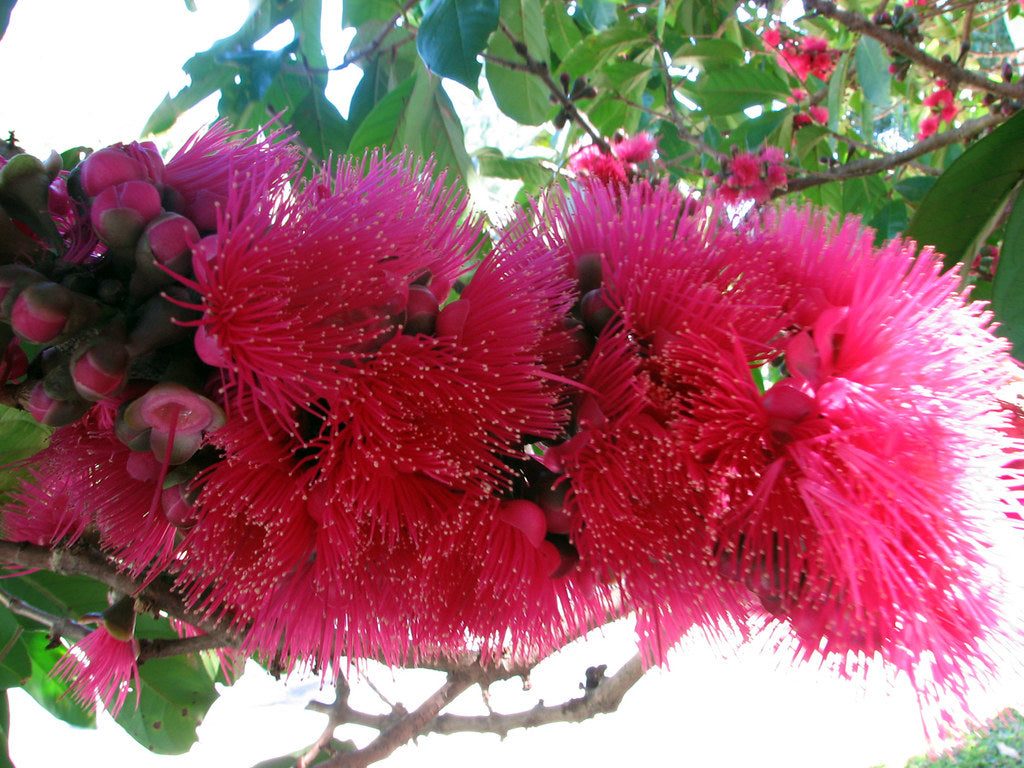Love it? Add to your wishlist
Your favorites, all in one place. Shop quickly and easily with the wishlist feature!
[message]
[title]
[message]




Veliyath Gardens
Couldn't load pickup availability
Malay Apple (Syzygium malaccense) – A Tropical Delight
Malay Apple, scientifically known as Syzygium malaccense, is a tropical fruit tree native to Southeast Asia and Australia. The fruit has been cultivated since prehistoric times by Austronesian peoples, spreading through regions such as Malaysia, Indonesia, Vietnam, and Thailand. This fruit is revered for its vibrant red, pink, or white color, crisp texture, and subtly sweet flavor. With its rich history, medicinal properties, and cultural significance, the Malay Apple holds a special place in the world of exotic fruits.
Malay Rose Apple
Mountain Apple
Rose Apple
Otaheite Apple (Jamaica and Caribbean regions)
Pommerac (Trinidad and Tobago)
Botanical Name: Syzygium malaccense
Family: Myrtaceae
The Malay Apple is visually striking with its dark red, oblong-shaped skin. However, some varieties feature hues ranging from pink to white. When sliced open, the fruit reveals a white, spongy flesh surrounding a large, brown seed. The flavor is mildly sweet with a hint of floral notes. It has a crunchy yet juicy texture, similar to a pear or watermelon, making it incredibly refreshing and thirst-quenching.
Malay Apple is not just a delicious tropical fruit but also a nutritional powerhouse. It is packed with essential vitamins, minerals, and antioxidants that promote overall well-being.
Calories: 25-35 kcal
Carbohydrates: 6-8 g
Vitamin C: High levels for immune support
Vitamin A: Enhances vision and skin health
Vitamin B-complex: Boosts metabolism
Iron: Aids in red blood cell formation
Calcium & Magnesium: Strengthens bones and teeth
Potassium: Regulates blood pressure
Dietary Fiber: Supports digestion
Boosts Immunity – High levels of vitamin C help strengthen the immune system and protect against infections.
Aids Digestion – The fiber content promotes healthy digestion and prevents constipation.
Heart Health – Rich in antioxidants and potassium, Malay Apple helps regulate blood pressure and reduces the risk of heart diseases.
Weight Management – Low in calories and high in water content, it’s an excellent fruit for hydration and weight loss.
Regulates Blood Sugar – The fruit has a low glycemic index, making it beneficial for diabetics.
Detoxifying Properties – Acts as a natural detoxifier, helping to cleanse the liver and flush out toxins.
The Malay Apple is a versatile fruit that can be consumed raw or cooked. It is enjoyed in various forms across different cuisines.
Fresh Consumption: The fruit is often eaten raw, either alone or in fruit salads.
Juices & Smoothies: Its naturally refreshing taste makes it ideal for fresh fruit juices and blended beverages.
Jams & Jellies: The pulp is often stewed with sugar and ginger to create delicious jams.
Desserts: It is commonly used in ice creams, sorbets, and fruit-based desserts.
Culinary Dishes: Some cultures use it in savory dishes, incorporating it into sauces and chutneys.
Fermented Beverages: In some regions, the fruit is fermented into a mildly alcoholic beverage.
Malay Apple trees are evergreen and grow up to 15-20 meters (50-65 feet) tall, with a broad, dense canopy. They thrive in tropical climates and prefer humid, lowland areas with well-distributed rainfall.
Soil: Well-drained, loamy soil with good organic content.
Climate: Warm and humid tropical conditions.
Sunlight: Requires full sun for optimal growth and fruiting.
Watering: Regular watering is necessary, especially during dry periods.
Fertilization: Use organic compost or balanced fertilizers to enhance fruit production.
Pollination: Mostly pollinated by bees and other insects.
Prune the tree regularly to maintain its shape and encourage fruit production.
Protect young trees from strong winds and heavy rains.
Monitor for pests like fruit flies and caterpillars, and use natural pesticides if needed.
The tree starts fruiting 2 to 3 years after planting.
The harvesting season varies by region but usually falls between spring and summer.
Fruits are best handpicked when they turn deep red and slightly soft.
Fresh Malay Apples should be consumed within a few days as they spoil quickly.
For longer preservation, fruits can be stored in the refrigerator for up to a week.
The fruit can also be dried or frozen for extended use in recipes.
In Southeast Asia, Malay Apple is considered a symbol of prosperity and abundance.
In the Caribbean, the fruit, called Otaheite Apple, is a common sight in local markets and is often used in traditional remedies.
Indigenous tribes in Malaysia and Indonesia have used parts of the tree for centuries in traditional medicine.
The wood of the tree is strong and durable, often used for making furniture and handicrafts.
A refreshing and hydrating fruit, perfect for hot summers.
A natural immune booster that promotes overall well-being.
A low-calorie, nutrient-rich snack ideal for health-conscious individuals.
A wonderful addition to fruit salads, beverages, and desserts.
A beautiful ornamental tree that enhances landscapes with its lush foliage and vibrant fruits.
The Malay Apple (Syzygium malaccense) is more than just a fruit—it is a nutrient-rich, flavorful, and culturally significant tropical delicacy. Whether you enjoy it fresh, in juices, or as part of a savory dish, this exotic fruit adds a unique touch to your diet. If you have space in your garden, growing a Malay Apple tree is a rewarding experience, providing both aesthetic beauty and delicious, healthy fruit for years to come.
Soil: Well-drained, loamy soil with good organic content.
Climate: Warm and humid tropical conditions.
Sunlight: Requires full sun for optimal growth and fruiting.
Watering: Regular watering is necessary, especially during dry periods.
Boosts Immunity – High levels of vitamin C help strengthen the immune system and protect against infections.
Aids Digestion – The fiber content promotes healthy digestion and prevents constipation.
Heart Health – Rich in antioxidants and potassium, Malay Apple helps regulate blood pressure and reduces the risk of heart diseases.
Weight Management – Low in calories and high in water content, it’s an excellent fruit for hydration and weight loss.
A refreshing and hydrating fruit, perfect for hot summers.
A natural immune booster that promotes overall well-being.
A low-calorie, nutrient-rich snack ideal for health-conscious individuals.
A wonderful addition to fruit salads, beverages, and desserts.





